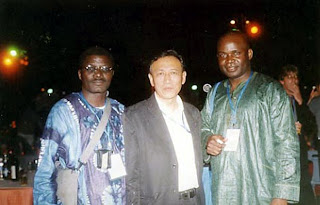Kimono: Return of the Rhumba Style man

What would Nigeria have done without Ras Kimono and his kindred in the Reggae music genre? In the 80s through the 90s – when the music industry had lesser financial and media muscles as it has in these days of hip-pop and afro-pop – Ras Kimono with such other popular adherents like Majek Fashek (Prisoner of Conscience), Orits Wiliki (Koleman Revolutionary), Victor Eshiet (Mandators), Andy Shurrman, Peterside Ottong (late), Evi Edna-Ogoli, among others put Nigeria’s name on the global stage of Reggae music. Ras Kimono is particularly remembered for his unique heavily percussive reggae idiom, which sounded more like a cross-over between reggae and Afrobeat music. His form he had christened Rhumba Style – and he issued no les than six albums to prove his control of that peculiar form. In no time, he was the very top of the bill and no concert – Benson & Hedges, Lekki Sunsplash, Surprise 89, Badagry Black Music etc — was complete without the Massive Dread Band, which he led. Parti
